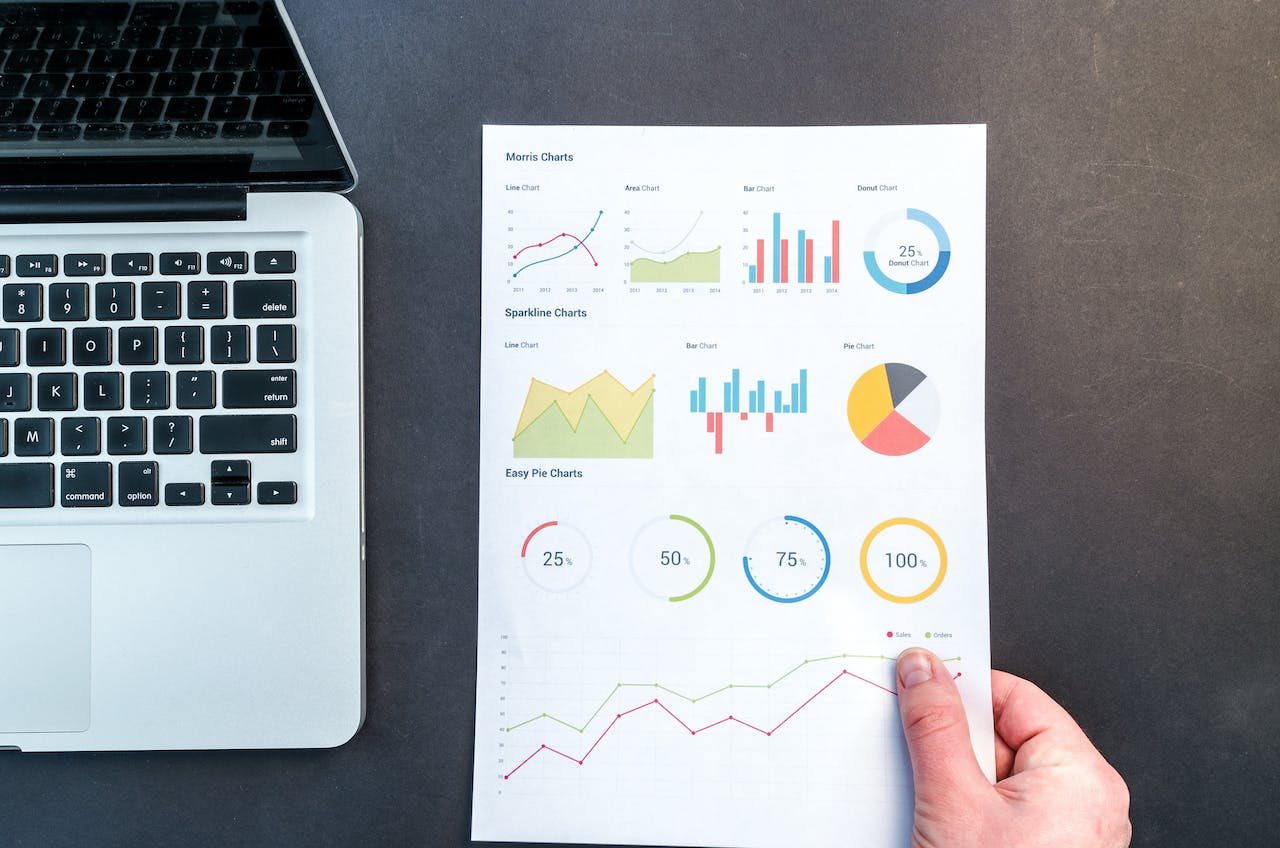
In today's rapidly evolving business landscape, the ability to make informed decisions is crucial for success. Organizations are inundated with vast amounts of data, and harnessing this information effectively can provide a competitive advantage.
Data-informed decision-making involves the strategic use of data to guide and support the decision-making process. In this comprehensive guide, you will delve into the fundamental principles and strategies for how to make better data-informed decisions.
What Is Data-driven Decision-Making?
Using data-driven insights to guide essential choices is the essence of data-driven decision-making. Businesses often depend on business intelligence systems to generate, share, and motivate action based on data insights, which are frequently presented as data visualizations.
By using this strategy, companies may make more intelligent and well-informed judgments based on historical data and the probability that similar events will occur in the future rather than on intuition or experience.
Businesses can now make choices more quickly, more cheaply, and more accurately thanks to data-driven decision-making, which has completely changed the way businesses operate.
Businesses that are at the forefront of their respective industries and are reaping the tremendous benefits from data-driven decision-making are doing so by enabling self-service analytics to empower decision-makers at all levels, from front-line staff to back-office executives to boardroom executives, to make decisions that are supported by insightful data.
Examples Of Data-Driven Decision-Making
The biggest and most successful companies in the world today make critical business choices by using data. Examine these well-known companies' success stories to get insight into how your firm might use data analytics to inform decisions.
Leadership Development At Google
Google continues to place a strong emphasis on "people analytics." Google analyzed information from over 10,000 performance assessments as part of Project Oxygen, one of its well-known people analytics projects, and contrasted the results with employee retention rates.
Utilizing the data, Google was able to pinpoint the typical actions of top-performing managers and design training courses to further these skills. Managers' median favorability ratings increased from 83 to 88 percent as a result of these initiatives.
Real Estate Decisions At Starbucks
In 2008, after the closure of hundreds of Starbucks stores, the company's then-CEO, Howard Schultz, committed to using a more scientific approach to future store placement selection.
Starbucks now collaborates with a location analytics firm to identify the best sites for its stores based on information about traffic patterns and demographics. Prior to making decisions, the organization also takes the opinions of its regional teams into account. Before making a new investment, Starbucks utilizes this data to assess the chances of success for a particular location.
Driving Sales At Amazon
Amazon utilizes data to determine which items, based on past purchases and search activity trends, to suggest to consumers. Amazon powers its recommendation engine with data analytics and machine learning, not just random product suggestions.
According to a McKinsey assessment, 35 percent of Amazon's customer purchases in 2017 may have been influenced by the company's recommendation engine.
The Importance Of Data-driven Decision-making
This is the first time there has been such an extensive collection of information, yet it is also more complicated. Organizations need help handling and evaluating their data as a result.
In fact, according to a recent study by NewVantage Partners, just 32.4% of executives say their company has succeeded in fostering a data-driven culture, compared to 98.6% of executives who say that's their organization's goal.
According to a 2018 IDC report, companies have spent billions of dollars modernizing their operations, yet 70% of these projects fail because the firms focused too much on technology expenditures rather than creating a data-driven culture to support them. Many businesses are building three key competencies-data competence, analytics agility, and community-in an effort to become more data-driven.
It is a complex undertaking to change the way your firm makes choices. Still, the most considerable revolutionary influence on your organization will come from integrating data and analytics into decision-making processes. This kind of change requires a focused strategy for creating and improving your analytics program.
Why Make Decisions Based On Data?
It is advantageous to base judgments on data since it reduces risk. Data can sometimes be used as historical proof that you consult while coming to a judgment. Experts use historical data to develop judgments that are more likely to provide comparable positive outcomes.
Marketersand other professionals consult data for a variety of goals, such as enhancing client loyalty and determining which sales campaigns yielded the most outstanding results. Further justifications for using data in decision-making are as follows:
Increases Confidence
Professionals may make more confident conclusions thanks to the data's general objectivity. You might feel more confident that you're making the appropriate judgments when you know to support your decisions.
Data helps you comprehend the state of affairs more thoroughly, which facilitates the process of determining the potential consequences of a given choice.
Increases Proactivity
As you become more familiar with the data you are gathering, you will be able to make proactive judgments. Sometimes, the first applications of data in decision-making are reactionary. That is, a decision is made after the data has been examined and examined.
At some point, you may be able to take preventative action, such as seeing possibilities before your rivals do and reducing risks before they get out of control.
Improves Accountability
Decisions based on data increase responsibility as experts can monitor them. One might evaluate the outcome of a decision to ascertain if the decision-maker needs to modify their decisions or choose a different course of action.
Should the facts indicate that their choice had favorable outcomes, you may not need to make any modifications. This degree of openness guarantees that everyone abides by established company procedures and makes data collection for record-keeping simpler.
5 Steps For Making Data-driven Decisions
It takes experience to make judgments based on evidence. You must be able to translate unprocessed facts into practical actions that support organizational goals if you wish to advance your leadership abilities. When examining data, you may improve your decision-making by following these steps.
Know Your Vision
The future vision of your organization must be understood before you can make wise judgments. This assists you in making judgments based on both strategy and facts. Without context, graphs and figures have little relevance.
Find Data Sources
You may begin gathering data as soon as you've decided what your objective is. The kind of data you're gathering will determine the instruments and sources of information you employ. Make use of a universal reporting tool if your objective is to evaluate data sets related to internal corporate procedures.
Reporting systems provide a centralized point of reference for monitoring the status of work across your business. Specific reporting solutions allow you to collect data from several external sources, such as Microsoft Power BI. One of those tools may be used to examine rival data or marketing trends. Among the standard success criteria you might consider measuring are:
Gross Profit Margin
Deducting the cost of products sold from the company's net sales yields the gross profit margin.
Return On Investment (ROI)
ROI, or return on investment, is a frequently used metric to determine if an endeavor is worthwhile for time or financialcommitment. As a business statistic, it often monitors the performance of an investment.
Productivity
This gauges the effectiveness with which your business produces products or services. By dividing the whole output by the total input, you may get this.
Total Number Of Customers
It is helpful to monitor this straightforward metric. The more clients that pay, the more money the company makes.
Recurring Revenue
This figure, which SaaSproviders often use, represents the total income produced by all of your active, current members during a specific time frame. Typically, it is measured once a year or once a month.
Depending on your function at work and the goal you have set for yourself, you may measure a wide range of different data sets. Real-time data aggregation is now easier than ever, thanks to machine learning.
Organize Your Data
For business choices to be successful, data organization is essential for improving data visualization. It is challenging to make sure you are making the best judgments if you are unable to examine all of your pertinent facts in one location and comprehend how they relate to one another.
Perform Data Analysis
You may start your data-driven analysis when your data has been arranged. This is the time when you will take your data and turn it into valuable insights that will guide your decision-making.
In order to include the customer experience in your findings, you should examine the data from your executive dashboard in conjunction with user research, such as case studies, polls, or testimonials, depending on your objectives.
Draw Conclusions
You should start making assumptions about what you see as you go through your data analysis. To communicate your results with others, it is necessary to elaborate on the conclusions you draw from the data, which is why they need their part.
Benefits Of Data-Driven Decision-Making
You’ll Make More Confident Decisions
It will probably be simpler for you to make confident decisions about almost any business difficulty once you start gathering and evaluating data. This includes choosing to introduce or remove a product, change your marketing message, enter a new market, and more.
Data has many functions. One way it helps is by setting a baseline for what already exists, which enables you to see more clearly how decisions will affect your company as we advance.
You’ll Become More Proactive
A data-driven decision-making process is probably going to be reactive when it is initially put into practice. You and your business must next respond to the narrative that the data reveals. Although this is useful on its own, data and analysis may be used for other purposes in your company.
It's possible to use data more proactively with sufficient experience and the appropriate kinds and amounts of information, for instance, by seeing commercial possibilities before your competitors do or by seeing risks before they become too severe.
You Can Realize Cost Savings
There are several reasons why a company may decide to fund a big data project with the goal of making its operations more data-driven. The success percentages of various efforts vary, according to a recent NewVantage Partners study of Fortune 1,000 leadersfor the Harvard Business Review.
The poll found that leveraging data to reduce costs is one of the most effective approaches. More than 49% of the organizations that started programs aimed at cutting costs reported benefits from them. The outcomes of other projects could have been more consistent.
Frequently Asked Questions
What Is Data For Effective Decision-making?
The information must be precise, accurate, and directly related to the issue at hand in order to meet the goals of the decision-making process. This most effectively informs decisions, and it helps prevent erroneous conclusions.
What Is A Well-informed Decision?
When people have all the knowledge necessary to make an educated decision, they make that decision. It entails weighing the advantages, disadvantages, and possible consequences of each option before selecting the one that is best for you.
Why Is It Essential To Make Well-informed Decisions?
Making educated selections for your care has many advantages, including more knowledge, a better sense of well-being and self-assurance, happiness with your treatment, and a reduction in conflict and worry related to your choice.
What Is Effective Decision-making?
Decisions must be able to be carried out, whether they are organizational or personal. As a result, you must personally support the choice and be able to convince others of its advantages.
What Is A Data Decision?
Making strategic business choices that are in line with objectives, plans, and projects via the use of facts, measurements, and insights is known as data-driven decision-making.
What Are Positive Informed Decision-making Skills?
All of the abilities required to make a well-informed, logical conclusion are known as decision-making abilities. A competent decision-maker at work is able to weigh all the available information, comprehend the company's existing and desired states, and choose the best course of action.
Conclusion
This article aims to explain how to make better data-informed decisions. The ability to make better data-informed decisions is a fundamental aspect of achieving success in today's competitive environment.
By understanding the importance of data, establishing a data-driven culture, choosing the correct data, utilizing analytics tools, prioritizing data privacy, fostering collaboration, and embracing a culture of continuous learning, organizations can position themselves for sustained growth and resilience.




